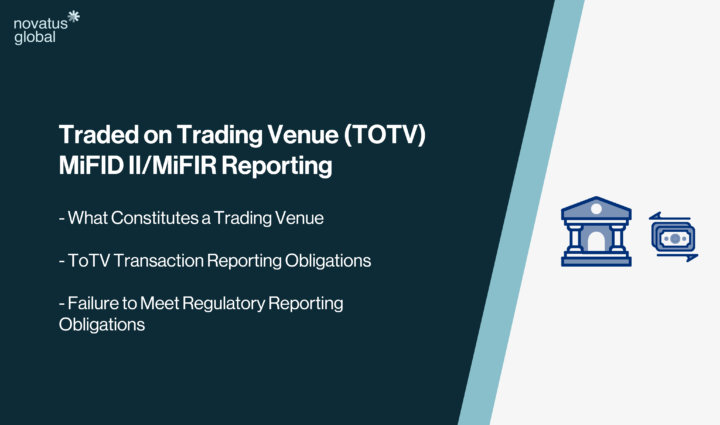
An Introduction to TOTV
In 2017, the European Securities and Markets Authority (ESMA) issued an opinion that clarified the concept of “traded on a trading venue” (TOTV). This opinion remains valid and is particularly relevant as it is concerned with the implementation of the Markets in Financial Instruments Directive (MiFID) and the Markets in Financial Instruments Regulation (MiFIR).
What is a Trading Venue
There are three categories of trading venue:
-
-
- Regulated Markets (RMs)
Regulated markets are traditional exchanges where securities like stocks and bonds are listed and traded. As the name suggests, these markets are regulated by an NCA as a regulated market, and would include venues such as the London Stock Exchange.
- Regulated Markets (RMs)
-
-
-
- Multilateral Trading Facilities (MTF/MTFE)
An MTF is different from a regulated market and is regulated by an NCA as an alternative to a traditional stock exchange. The Financial Conduct Authority (FCA) classifies an MTF as “an investment firm or market operator that operates a multilateral system in accordance with non-discretionary rules”.
- Multilateral Trading Facilities (MTF/MTFE)
-
-
-
- Organised Trading Facilities (OTF)
Organised Trading Facilities (OTFs) are multilateral trading venues that aren’t regulated markets or MTFs. According to the FCA “an OTF means a multilateral system which isn’t a regulated market or an MTF, and in which multiple third-party buying and selling interests in bonds, structured finance products, emission allowances or derivatives are able to interact”.
- Organised Trading Facilities (OTF)
-
Reporting Obligations for TOTV Transactions
Under MiFIR, Article 26 stipulates the reporting requirements for ToTV transactions. These reporting obligations aim to promote market transparency and regulatory market oversight. The specific obligations are as follows:
-
-
- Pre-trade transparency: applies to instruments traded on RMs, MTFs or OTFs. Trading venues must publish bids and offer prices alongside quantities for equity and equity-like products, allowing the creation of an order book. Order books enable market participants to make informed decisions based on real-time market data, helping to promote fairness within markets.
- Post-trade transparency: the revised MiFID II dictates that trading venues should publish post-trade data, including price, volume and trade time, as soon as possible after execution. For large in-scale trades, some waivers can be granted to prevent large orders from suffering from adverse market movements.
-
Failure to Meet Reporting Obligations for Transactions ToTV
Maintaining compliance with TOTV reporting requirements is essential for firms who wish to avoid regulatory intervention and potential penalties. The most important metric for meeting TOTV standards is ensuring accurate and timely reporting for all qualifying transactions.
European firms must comply with the European Securities and Markets Authority’s (ESMA’s) reporting guidelines and UK firms should align with the Financial Conduct Authority’s (FCA’s) guidance. Keeping up to date with guidance and news published by market regulators allows firms to prepare for upcoming regulatory changes, enabling them to remain compliant and ensure their reporting systems are in line with TOTV requirements.
Novatus En:ACT is a SaaS reporting platform designed to streamline your transaction reporting compliance and adhere to your G20 reporting obligations.
For more information on how Novatus En:ACT can assist your firm’s regulatory reporting compliance, get in touch, and one of our experts will get back to you shortly. – Failure to Meet Reporting Obligations
Trading Venue FAQs
A trading platform is the software or user interface used to submit the trade, whereas a trading venue is the actual location where those orders are matched and executed.
For example, if you use the platform provided by your online broker to buy shares in a company on the London Stock Exchange, the broker’s platform is the trading platform, and the London Stock Exchange is the trading venue.
Systemic Internalisers are not trading venues as they are bilateral systems that execute orders on an organised basis without order interaction, while trading venues facilitate multilateral trading interactions.
Exchanges fall under the category of Regulated Markets (RM) since they act as a multilateral system and bring together parties with buying and selling interests. Under UK MiFIR, RMs are classified as trading venues. Therefore, exchanges are classified as trading venues under the same regulation.












